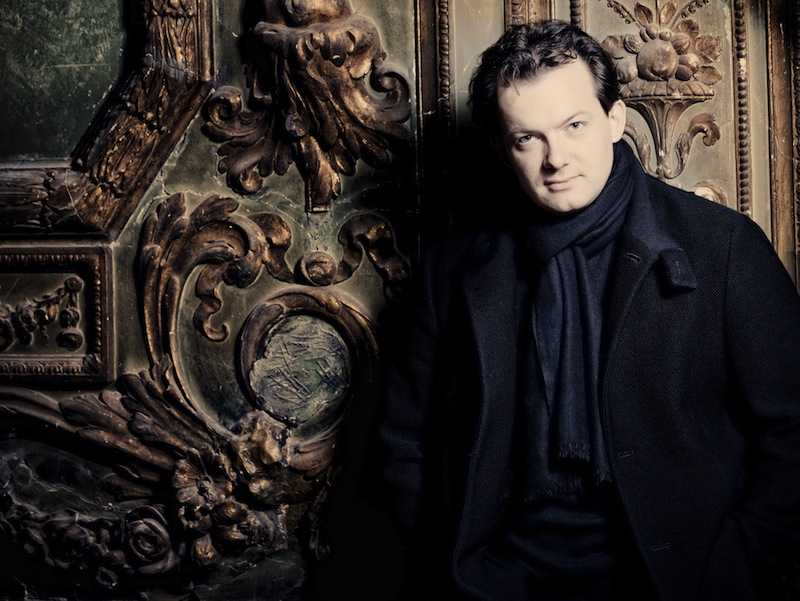Bard in Boston: Andris Nelsons talks music and Shakespeare

Andris Nelsons launches the Boston Symphony Orchestra’s Shakespeare festival Thursday night. Photo: Marco Borggreve
What music suits a Bard best?
Beginning Thursday and continuing through February 13, the Boston Symphony Orchestra and its music director Andris Nelsons will commemorate the 400th anniversary of William Shakespeare’s death with three programs of music inspired by the playwright’s works.
Even with three full concert programs devoted to it, this initiative could only dip a toe into the ocean of orchestral works based on Shakespeare’s plays and poetry. How to choose? In an interview at his Symphony Hall office, the Latvian-born maestro made the process sound simple.
“We wanted a mix,” Nelsons said, “some very classical, like Tchaikovsky’s Romeo and Juliet and Prokofiev’s Romeo and Juliet.
“And then Dvořák’s Othello and Strauss’s Macbeth– pieces written long ago but not very often performed– and pieces that were written quite recently.” The last will include Hans Abrahamsen’s let me tell you for soprano and orchestra, inspired by Ophelia in Hamlet, and Hans Werner Henze’s Eighth Symphony, a 1992 BSO commission based on a scene from A Midsummer Night’s Dream.
Most recent of all will be American composer George Tsontakis’s Sonnets, Concerto for English Horn and Orchestra, commissioned by the BSO expressly for this series of concerts and for its English horn player Robert Sheena. Sonnets will receive its world premiere on February 11.
At the time of this interview last fall, Nelsons had not seen the Tsontakis score yet, but he mused freely on Shakespeare’s appeal to other composers in all countries and eras.
“He’s problematic, you know?” Nelsons said. “This question—‘to be or not to be’–is a constant question for all of us, and will be always.
“We look at Hamlet through Shostakovich’s eyes,” he said, touching on another festival item, the theater music the Russian composer composed while still a student (not the much later score to a film of Hamlet).
Recalling Shostakovich’s wary relations with the deadly Stalin regime in the U.S.S.R., Nelsons said, “Three hundred years [after Shakespeare], what was in Shostakovich’s life? To be or not to be!” In this very early theater score, “there is a requiem, a funeral march, Ophelia’s song, a dance. In all of this already there is some kind of irony and drama” characteristic of this composer.
Aren’t both those things already in Shakespeare’s play? “You can say this music is about the play and the dramatism of Hamlet,” Nelson answered. “Of course it is, but I’m sure, if you see the parallels to how he lived [under Soviet rule], Shostakovich was kind of a Hamlet in his life, you know? He faced these questions in a very personal way.”
Nelsons gave all the festival composers credit for tackling some of the world’s greatest literature. “Each of these composers connects with Shakespeare, of course, admiring his work, but I think it takes a lot of courage–these plays are so amazing already, to have the courage to try to tell the story in a symphonic way, you have to have inner reasons to express. And therefore I think these pieces are very strong, even though they’re all different.
“For example, Tchaikovsky’s Romeo and Juliet. I think it is more about Tchaikovsky’s life. Afterward, it was kind of forbidden in Soviet times [to talk about] some private and personal things, but then it came out in letters of Tchaikovsky that he was very much in love when he composed Romeo and Juliet.
“He was involved with a man, and in the music he expressed his feelings. Of course he was inspired by Shakespeare, and also that kind of love which could not be fulfilled. I think he respects and admires Shakespeare, but he presents his own [emotions]. That’s what’s so great: he’s not illustrating the story, but is actually bringing to the story his own feelings.”
Turning to himself and the BSO, Nelsons went on, “That’s what it should be when we perform music—we bring what we subjectively think the composer, or in this case Shakespeare, wants to present.
“But still, I think we can only do it if we listen not only through our intellectual understanding—you know, ‘Oh, it’s Shakespeare and it’s Romeo and Juliet so we’re playing and there’s a story’—but there’s also a filter between your brain’s intellect and your emotional world, and then the result comes out very subjective. I think that’s the goal, and then we can affect the audience.”
“The audience comes with different backgrounds and different experience, and they will find something different in Shakespeare or any other pieces. And I think that’s a great thing, in this little Shakespeare festival, the variety of that. A person will say, ‘I want to hear those two stories of Romeo again, or I want a new story that’s an English-horn concerto, or Ophelia’s story in this Abrahamsen piece.’
“Or Henze! People think ‘Oh, Henze, that’s probably something very, very brainy.’ But actually it’s connected to how he finds a way to Shakespeare. It’s very interesting to look at in different ways.”
The BSO will perform Shakespeare-inspired works by Weber, Henze, and Mendelssohn Thursday through February 2; Shostakovich, Abrahamsen, and Prokofiev February 4, 5, and 6; and Strauss, Dvořák, Tsontakis and Tchaikovsky February 11, 12, and 13. bso.org; 617-266-1200.
Check back on Boston Classical Review for Part II of this interview, with topics to include Andris Nelsons’ developing relationship with the BSO players and his views on new and American music.
Posted in Articles



